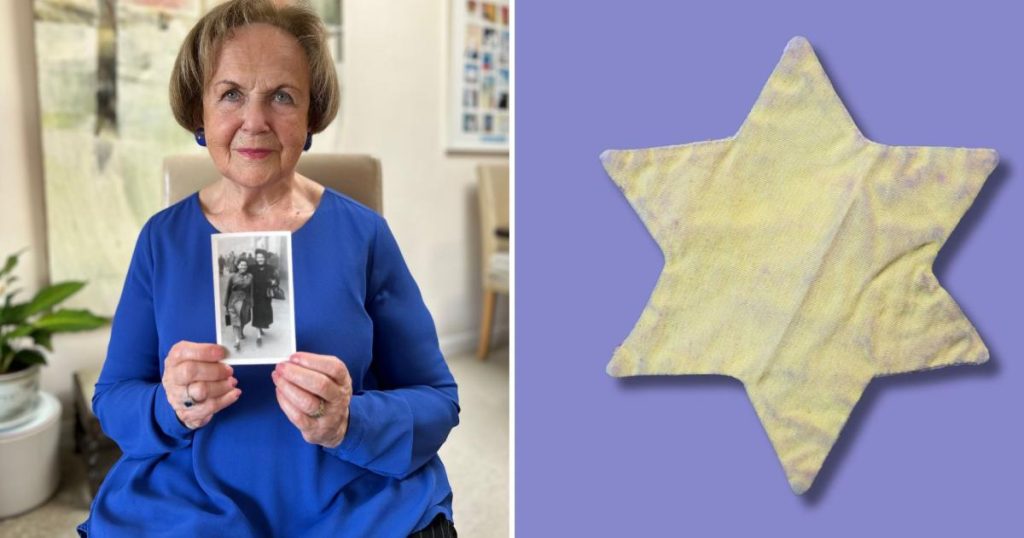They found just 7,500 survivors at Birkenau and surrounding camps, where in less than five years, 1.1 million people – mostly Jews along with Poles, Roma, Sinti and Soviets – had been murdered by the Nazis.
The liberation date was chosen as Holocaust Memorial Day, marked in the UK this year with services, talks and events.
Oral historian Bea Lewcowicz, the director of the Refugee Voices Testimony Archive of the Association of Jewish Refugees, is holding one such event at her nearest library in Belsize Park.
On January 18 she interviews Whetstone resident Mala Tribich MBE, a survivor of Bergen-Belsen concentration camp.
Mala Tribich, born Helfgott, got a letter from brother Ben in 1947 to say he had also survived and was living in England. (Image: Bea Lewcowicz)
“The 27th commemorates specifically the liberation of Auschwitz and I wanted to do something on the survivors from Poland, which had the highest Jewish population in Europe before the war at 3.3 million,” she said.
“Three million were killed. Some survived because the country was cut in two and half given to the Soviets, who deported Jews to Siberia. Conditions were terrible but they survived.”
Mala was born Mala Helfgott in 1930 in Poland, and when the Nazis invaded in 1939 the family were forced into Piotrków ghetto.
For payment, a couple agreed to hide Mala and her cousin, passing them off as relatives from Warsaw, but Mala missed her family and returned to the ghetto.
Soon after, her mother and younger sister were taken into nearby woods and murdered. Mala became a slave labourer, was deported to Ravensbruck, then put on cattle trucks to Bergen-Belsen where she contracted typhus.
When the British Army liberated the camp in 1945, she was transferred to a children’s hospital to recover, and then sent with other survivors to Sweden to recuperate.
To her surprise, in 1947, she received a letter from brother Ben, the future Olympic weightlifter, to say he was in England. He was the only other member of her close family to survive.
“Mala is a prolific speaker, she’s 94 with amazing recall and goes around schools telling her story, and we are very lucky she has time do this talk,” says Bea, who is the daughter of survivors.
Her own father Josef hailed from Katowice in Poland and was a slave labourer who survived six camps, while her mother Gertrud survived the war in hiding in Slovakia.
Bea, who has recorded many survivors’ witness accounts, has curated an online exhibition of 80 Objects which launches on January 20 in partnership with the AJR and UK government.

Each item, saved by survivors from their ordeals, is accompanied by a short video with the owner explaining its relevance.
They include Mala’s letter from her brother, First World War medals, a wedding ring, a German passport marked with a J, a suitcase label, and a Kiddush cup, which is used to hold wine or grape juice during the Kiddush, a blessing recited over the Shabbat.
Among items from the Kindertransport, which brought 10,000 unaccompanied Jewish children to the UK, there are several teddy bears, including that of Eve Willman from Wembley, who arrived on the Kindertransport in 1939, and was reunited with her beloved Bearly – along with her father – in 1946.
There is also the pocket-sized bear carried by Muswell Hill survivor John Hadju during the siege of Budapest, which he survived with his mother.

“There’s a little powder box given to a survivor by her brother in Lodz ghetto on her 16th birthday, and a silver spoon engraved with the name of a boy who came with his brother and parents on the last train from Berlin with only hand luggage,” says Bea.
“These objects all have huge meaning for them. They are a link to a lost past, a pathway into history and a way of activating an archive of four or five hour testimonies
“They are very relatable. We all have objects which are significant for us and can be used in classrooms as a starting point for discussion about what you would take if you had to leave.”
The objects include Bea’s mother Gertrud’s fake birth certificate, which helped her and her parents survive the war in Slovakia.
As the Holocaust passes out of living memory, she says the objects are a tangible link to survivors and their traumatic experience of discrimination, emigration, and survival.
“In some ways they become witnesses to atrocities and persecution.”
The theme for this year’s Holocaust Memorial Day is ‘For a better future’.
“It is important for survivors to be recognised and to tell their story.
“They want people to learn what happens when there is persecution and people don’t stand up to it, so this history isn’t repeated, and to see that you can overcome terrible things, have families, and live a happy life.”



